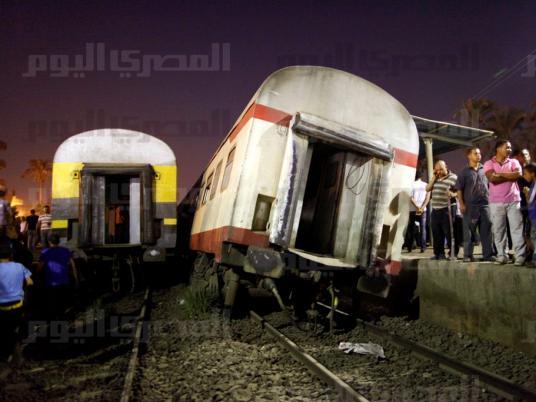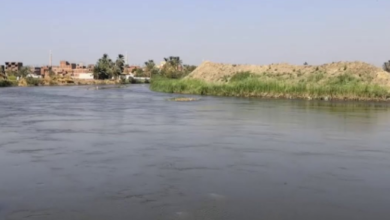
A train crash in Fayoum that left at least three dead and more than 40 injured Saturday continues to stir discussion in Monday’s papers, with some newspapers digging deeper into the state of the country’s railway system, while others subtly throw around blame on different individuals.
Independent daily Al-Shorouk dedicates a full page to the train crash and its aftermath, including a heartbreaking account of the collision that left a young bride dead, four days before her wedding.
Al-Shorouk exposes that it remains unknown who exactly decided to operate the train on its first trip heading to Cairo from Fayoum, before it collided head on with another train on its way from Alexandria to Fayoum on the same track, suggesting that an error by the switch operator caused the accident.
The newspaper quotes railway workers who refused to accept the blame. Commenting on the crash, Freedom and Justice Party leader Essam al-Erian took their side, adding that in democratic Egypt, no employees would be scapegoated, according to Al-Shorouk.
Transport Minister Mohamed al-Matiny maintains that whoever is responsible for the accident will be punished, and privately owned daily al-Tahrir runs a front-page headline stating that Matiny proclaimed he is willing to resign if found accountable.
Al-Tahrir cites a source from the railway station who deemed “90 percent of trains unfit for service” and lacking sufficient brakes, while another feature story directly refers to “carelessness and disregard for Egyptian lives.” Many have blamed the past successive governments for failing to enforce basic safety standards on the country’s railways, which has led to several deadly accidents over the years.
Independent daily Al-Watan says that 15 have been killed and 81 injured in 19 different train accidents in just one month. In its front-page story, the newspaper quotes Mostafa Kenawy, head of Egypt’s railways, as saying, “The accidents are caused by wrong behavior from either citizens or drivers.”
“And the rails keep bleeding,” screams a headline on the inside page of Al-Watan. The extensive report gives readers a reality check by providing information about 10 substantial train crashes in Egypt over 10 years. The paper also includes witness accounts from some of the injured.
In a deceptively similar editorial manner, state-run Al-Akhbar begins by asking, “When will the blood stop spilling on Egypt’s railway?” The paper quotes experts who admitted to the deteriorating conditions of the railway, adding that they need massive funds to overhaul the system and that the lack of sufficient training of the workforce has resulted in most railway accidents.
The paper then continues to quote engineers who somehow all agree that most train accidents are caused by drivers’ recklessness and workers’ mundane mistakes. Ultimately, the report takes an apologetic turn, and Al-Akhbar reaffirms its state-run status by quoting another transportation expert who finds that blaming the transportation minister is unjustified, since he only took his post no more than two months ago.
As for the state-run Al-Ahram, it dedicates only a small paragraph to the Fayoum train crash, leaving out the number of victims but stating that their families will receive LE20,000 in compensation.
In another bizarre incident, Al-Watan and Al-Akhbar both make similar editorial decisions to run a story about a woman who pierced her cheek with a razor blade and proceeded to write something with her own blood on the walls of the presidential palace in Heliopolis. In a telling move, both newspapers decided to run photos of the woman during her breakdown on their front pages. Al-Watan refers to the woman as someone who has led a bitter life that has stripped her of all dignity and hope, while Al-Akhbar refers to her as a mental patient.
Another story making the rounds in the local press is the public prosecutor calling for investigation into former presidential candidate Ahmed Shafiq’s vote-rigging complaint, which listed specific incidents of ballot rigging and invalidation. Al-Tahrir quotes a member of the Presidential Elections Commission who states that, regardless of their results, the investigations will not have any effect because the commission’s decision to announce Mohamed Morsy as president is immune from challenges.
Morsy’s former party, however, is not immune to other types of challenges. In his front-page column, Al-Tahrir Editor-in-Chief Ibrahim Eissa challenges the claim that the Brotherhood’s Freedom and Justice Party is the majority party. Parliament, he writes, which can be a measure of majority-party dominance, has been dissolved. Even then, FJP only represented 40 percent of the seats, which does not justify them forming more than half the government, he states. Using plain numbers, Eissa goes on to support his reasoning that the FJP is not the majority party, and calls it an “illusion.”
Egypt’s papers:
Al-Ahram: Daily, state-run, largest distribution in Egypt
Al-Akhbar: Daily, state-run, second to Al-Ahram in institutional size
Al-Gomhurriya: Daily, state-run
Rose al-Youssef: Daily, state-run
Al-Dostour: Daily, privately owned
Al-Shorouk: Daily, privately owned
Al-Watan: Daily, privately owned
Al-Wafd: Daily, published by the liberal Wafd Party
Youm7: Daily, privately owned
Al-Tahrir: Daily, privately owned
Al-Sabah: Daily, privately owned
Freedom and Justice: Daily, published by the Muslim Brotherhood's Freedom and Justice Party
Sawt al-Umma: Weekly, privately owned
Al-Arabi: Weekly, published by the Nasserist Party
Al-Nour: Official paper of the Salafi Nour Party




